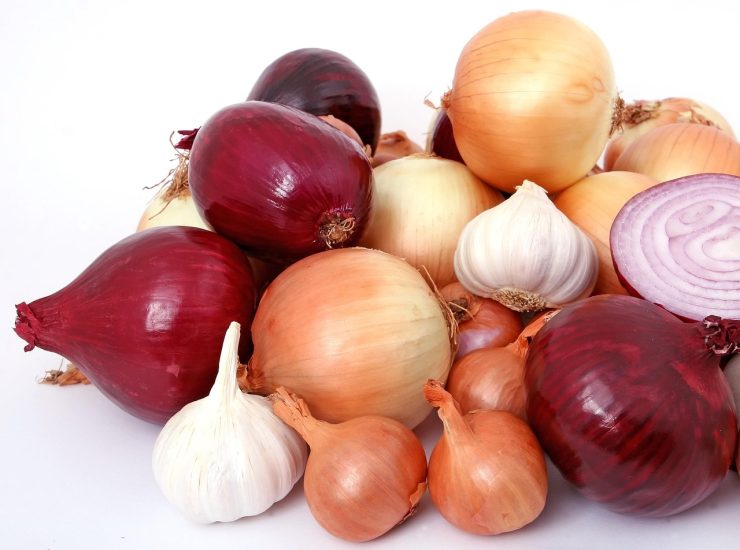Why You Should Start Loving Onions (Yes, Really)
Let’s be honest—onions don’t have the best reputation. They make you cry, they linger on your breath, and their strong taste can be… a lot. But here’s the thing: onions are total underdogs in the health world. While they may not have the glam factor of kale or avocado, they’ve been around forever—like, ancient-human-diet kind of forever—and they’re bursting with health benefits we shouldn’t ignore.
You might not see them topping trendy “superfood” lists, but onions 100% deserve a spot at the table. In fact, forget the old saying “an apple a day…”—it might be more accurate to say “an onion a day keeps the doctor away.”
So What Makes Onions So Awesome?
Onions belong to the same veggie family as garlic, shallots, leeks, and scallions. (And let’s face it, garlic is already a certified kitchen superhero.) Onions are packed with B vitamins (like B6, B1, folate, and biotin), vitamin C, manganese, potassium, copper, and a whole bunch of plant-powered compounds known as polyphenols.
One of the big standouts? Quercetin—a natural antioxidant with major anti-inflammatory and anti-histamine powers. It helps protect against everything from seasonal allergies to heart disease, high blood pressure, urinary issues, even cancer. It’s also great for calming inflammation in general, which means it could help with things like arthritis, asthma, and more.
And get this—onions contain more of these antioxidant polyphenols than garlic, leeks, tomatoes, carrots, and even red peppers. Yep, they’re kind of a big deal.
Fighting Cancer? Onions Are on Your Side
Onions are so powerful, the National Onion Association (yes, that’s a real thing!) considers them a legit anti-cancer food. Thanks to their mix of quercetin and sulfur-based compounds (with sciencey names like diallyl disulfide and S-allylcysteine), onions may help slow tumor growth, protect against gene mutations, and knock out free radicals.
What kinds of cancer are we talking about? Breast, ovarian, colon, prostate—you name it. Even having onions just a few times a week makes a difference, but the biggest health win comes from eating about half a cup a day. Luckily, that’s not hard: throw green onions into your morning eggs, slice some red onion into your lunch salad, or load up your dinner with salsa or roasted veggies.
Bonus: cooking onions doesn’t kill their nutrients. So whether they’re raw in a salad or caramelized in your stir-fry, you’re still getting the good stuff.
Your Heart ♥ Onions
Like garlic, onions are super heart-friendly. The sulfur compounds help prevent blood clots by stopping platelets from clumping together. That means a lower risk of heart attacks, strokes, and other circulatory issues. They can even help reduce blood pressure and lower “bad” cholesterol (LDL) and triglycerides—especially when you’re also eating plenty of fruits and veggies.
Inflammation, Be Gone
Back to our buddy quercetin—this powerhouse not only helps with allergies and asthma, but it also fights inflammation all over the body. It’s been linked to benefits for conditions like Alzheimer’s, autoimmune issues, and more. One particular compound in onions, called Onionin A, even helps regulate the immune system and can be especially helpful for people dealing with chronic inflammation.
Bones, Joints, Gut Health… and Even Diabetes
Who knew onions were good for your bones? Some studies have shown that women who eat onions regularly (especially post-menopause) have better bone density and fewer fractures. That same sulfur content also supports strong connective tissue—great news for your joints, ligaments, cartilage, and even your hair!
They’re also natural germ-fighters. Raw onions have been shown to kill off bacteria that can cause everything from gum disease to ulcers and food poisoning. So go ahead—pile fresh onions on your salad or picnic plate.
And don’t forget the gut! Onions are rich in inulin, a prebiotic fiber that feeds your healthy gut bacteria. That means better digestion, stronger immunity, better absorption of nutrients—and even better mood. Inulin may also help manage blood sugar and reduce the risk of diabetes. Some studies have even found it improves glucose control in people with type 2 diabetes.
Better Sleep & A Brighter Mood
Thanks to their folate content, onions may give your brain a little boost too. Folate helps regulate mood by reducing excess homocysteine in the body—a compound that can mess with feel-good hormones like serotonin, dopamine, and norepinephrine. So if you’re dealing with mood swings or sleep struggles, onions might actually help more than you think.
Bye-Bye, Colds & Flu
Turns out, onions have long been used as natural medicine. Native Americans used them to fight off colds, and even the World Health Organization has given onions props for helping treat coughs, congestion, and bronchitis. They’ve even been used as remedies for colic and vomiting. Not bad for a humble kitchen staple.
Choosing the Best Onions
Not all onions are created equal! Shallots have the most polyphenols, but yellow onions have the highest flavonoid content. And as a general rule, the deeper and richer the color, the more nutrients you’ll get—so red onions tend to be the nutritional MVPs.
Go organic if you can. Conventional onions are often irradiated to prevent sprouting, but that process can also zap some of their nutrients. And here’s a fun tip: most of the good stuff is concentrated in the outer layers, so don’t peel too much away! I even toss the outermost layer into soups or stocks—waste not, want not.
Want to Live to 100? Eat More Onions
Not kidding—there was a study done on centenarians (people who live to 100+), and one thing they all seemed to have in common? They ate a lot of onions. Maybe it’s just a coincidence… or maybe it’s yet another reason to sneak onions into your meals.
Personally, I love throwing them into scrambled eggs, adding them to tuna or salmon salad, or sautéing them with a bunch of veggies for dinner. And if everyone’s eating onions at the same time, no one notices the onion breath anyway, right?











